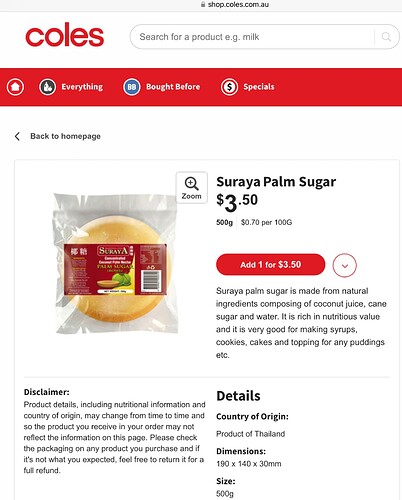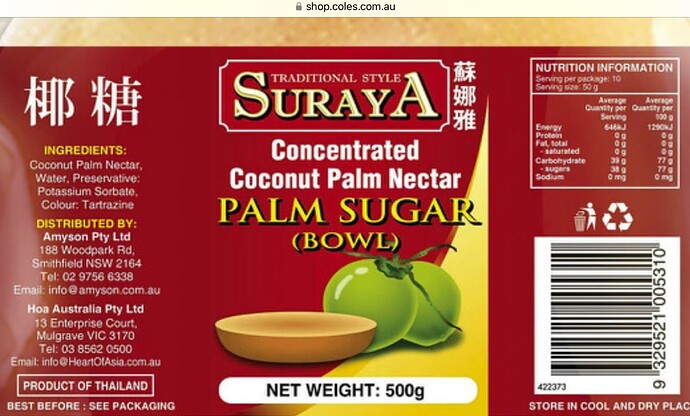Why don’t food manufacturing companies leave sugar out and leave it to the customer to put their own in - if they want to.
Good question. Maybe food manufacturers want to sell product.
![]()
Do you have some examples of foods where you feel this could be useful?
Many products it would be near impossible or impracticable for a consumer to add sugar in. A good example would be an ice block (or other products where the food is packaged up to eaten as prepared). I suppose one could roll their sugar free ice block in a tub of sugar to coat the outside to boost the overall sweetness. While possible, I am unsure how many would take a tub of sugar to the local milk bar to do such and how one has added (could be more than a product containing sugar).
Some food products it may be practicable such as cereals or cake mixes…where the consumer does something before eating (add milk or cook it). Some food products already have no sugar added (such as fresh produce/meats, flours, some dairy products etc.
Sugar is added for the sole purpose of taste…to make something taste more appetising by making it sweeter.
Because they are selling taste and convenience.
Sugar is not only used to add a sweet taste to food:
- Acts as a preservative in jam making.
- Is a raising/bulking agent when whisked with eggs.
- Provides texture when creamed with butter.
- Kicks starts yeast to leaven dough in bread making.
- Balances acidity.
Just a few uses I can think of at the moment ![]()
Sugar is cheap and used as filler.
The amount of sugar in some products is UNBELIEVABLE.
I am a label reader, and always look to see.
Cannot see why sugar is needed in tomoto sauce.
Some manufacturers haven’t caught on people want low sugar and salt products.
I buy this in tomato sauce, lowest sugar and salt content and importantly Australian tomatoes.
My pet hate is added sugar in ‘natural muesli’ and palm oil. Anything with palm oil when I know it is and not mis-labeled goes back on the shelf.
I bake a lot and always cut sugar in a recipe by 50%.
Never had a failure yet in a recipe doing that.
- List item
We do the same (we usually use 1/3) and buy basic/unprocessed ingredients and do our own. This allows us to control amount of sugar, salt and unwanted fats in our diets. This includes making our own muesli from raw ingredients and tree nuts from the garden.
In addition to the list that Gaby gave there would be a whole class of biscuits/cookies and quite a few cakes that would not have the same texture as the original recipe and not the same taste of course. In jam making you will need to have more pectin or boil the mix much more or it will not set with 50% sugar as it absorbs water as well as acting as a preservative.
These changes may suit you but we ought not give the impression that you can halve the sugar and the only effect it will have is to reduce sweetness and calories.
Is the alternative to using less sugar in a well known recipe to look for different recipes that are low sugar? Assuming one’s diet is too high in sugar, otherwise enjoy as is. ![]()
There are many collections of low sugar recipes on line. Some for health reasons, others because they are traditionally made that way. Japanese and some other Asian cuisines come to mind. Nothing like a rice cake to feed the hunger pangs mid morning. ![]()
On the first trip to Japan we thought many foods, especially pastries, were devoid of flavour because of low/no sugar. After a few dozen trips we came to appreciate the wonderful subtle flavours in everything - well most everything. Even after years some foods were ‘so special’ we always saved them for people more deserving than ourselves. ![]()
Granted there’s often an elevated amount of sugar and salt in some processed foods, but in our own baking there are proportions to be followed in a recipe and cutting down on the amount of sugar unbalances the end result, and I say this from personal experience ![]()
That would be a better option, although usually (but not always) low sugar means high fat.
In the European tradition, French sweets for example, sugar plays a big part in the recipe, just think of Madeleines, or cremè brûlée, or crème pâtissière …I’ll stop here? ![]()
Good question. An example of relatively recent sugar addition across the board is peanut butter. I now have to scutinise jars to ensure"no added sugar" or 100% peanuts. Why??
Or at least try to use fresh fruit and add no sugar if baking a pie or slice. Its more confusing trying to work out what sugar is healthier than the other. Ive heard palm sugar is better than castor sugar
I very much doubt that palm or caster sugar are any different in health. Caster sugar is the same as normal white sugar just milled finer for ease of dissolving when baking. Palm sugar is variable in texture, I have some that is a solid block which is going to make creaming with eggs etc a bit difficult.
Palm sugar can be produced from a variety of palms. Production usually involves boiling the raw product. What might be left of any nutrients after boiling will be limited?
Not all palm sugar is just palm sugar?
Note that Coles promotes “it is rich in nutritious value”. Pure Puffery?
At $7 per consumers might suggest, ‘it is rich in shareholder value” as an equally apt product promotion. ![]()
For those looking for cheaper and equivalent nutritional value. Store brand refined white sugar is available for less than $2 per kg or a fraction of the cost of palm sugar.
Unfortunately they aren’t the same thing and substituting white sugar with palm sugar will give different results. Palm sugar has a caramelish flavour which is used in many dishes to add depth of flavour. The same can’t be achieved with refined white sugar.
One should also not confuse the environmental impacts of palm oil with palm sugar. This SBS article provides some useful information:
Dopamine hits driving addiction = driving profit.
Is it recent? Most commercial brands have added sugar and salt for at least the last 30 years (since our kids were little and I started taking notice of ingredients). We always tried to buy unadulterated PB if we could find it, but it wasn’t always readily available (except at health food stores). In the last decade or so I’ve noticed it’s now common for supermarkets to have some ‘totally natural’ PB with no sugar, salt, emulsifiers, etc.
Sugar is a preservative as is salt.

